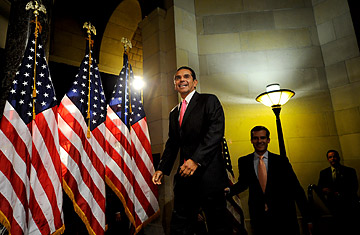
Mayor Antonio Villaraigosa arrives at Los Angeles city hall on Feb. 7, 2012
When he was a young man, Antonio Villaraigosa dropped out of school, was in numerous street fights and had a tattoo inked on his right arm that read: "Born to Raise Hell." In 2005 he became the first Latino mayor of Los Angeles since 1872. It was practically scripted: the inspirational tale of a troubled boy from the gang-infested Boyle Heights neighborhood of East L.A. who makes good, goes to city hall and turns Los Angeles into a "city of purpose."
But, until last week, the mayoral tale of Villaraigosa was starting to look like a box-office bomb. In 2007 came revelations of an extramarital affair with a Telemundo newscaster, which seriously hurt his popularity, particularly in the Latino community. His ambitious but ultimately misguided plan for a school-district takeover was defeated in court. A weakening economy and his unsystematic management style led to even more political stasis.
Then last week, Villaraigosa's career got a resurrecting jolt when President Obama appointed him to be chairman of the September 2012 Democratic National Convention in Charlotte, N.C. The choice was a mild surprise, even though the Democrats are focused on preserving their hold on the Latino vote as the key to victory in November — the subject of the latest cover story of TIME. Back in 2008, Villaraigosa had famously endorsed Hillary Clinton over then candidate Obama during the Democratic primaries. While the chairmanship might not hold much real authority, it has already renewed national interest in the mayor, who runs a city that is 48% Latino. And the broader spotlight has allowed him to refresh his local reputation in the City of Angels, a place that hasn't exactly been like heaven for many residents lately.
The mayor's biography — despite its blemishes — remains his strongest asset. Villaraigosa came from a broken home, in which his father, a Mexican immigrant welder, routinely beat his mother. His father left his family when Antonio was a young boy, and Villaraigosa spent his teenage years in and out of school, getting into scraps and trying to make ends meet with jobs that included shining shoes, selling the daily newspaper La Opinión and working at a car wash.
During his junior year of high school, Villaraigosa dropped out but returned at the encouragement of Herman Katz, his English teacher. After graduating from Theodore Roosevelt High School, Villaraigosa attended UCLA, where he received a history degree. He became a union organizer and then president of the Southern California branch of the American Civil Liberties Union before getting elected to the California state assembly in 1994. He served as speaker of the assembly from 1998 to 2000, then ran for mayor, lost but was elected to the city council. When he was finally elected mayor seven years ago, the excitement and expectations in Los Angeles during his inauguration, especially among Latinos, were infectious, if unrealistic. The telegenic mayor created much of the excitement. He made numerous grandiose promises, but his lack of understanding of the nuances of city politics and managerial experience hobbled him from the outset. There was a sense that the mayor's office was unfocused and that Villaraigosa's true passion was having his image appear on the local TV news. Then came the revelation of the affair with Mirthala Salinas of Telemundo. The Latino electorate, he tells TIME, "felt let down, more than with somebody else, but I'm in a great place with my family now, and I am proud of that."
Villaraigosa, 59, knows how to adjust his image. He's been doing it for years. Remember that "Born to Raise Hell" tattoo? He had it removed 15 years ago. "Peace, not war," he likes to say now. While he warmly welcomed the Obama appointment, its focus on his Hispanic heritage has also made him slightly uncomfortable. After all, he is the mayor of a huge city that is 52% non-Latino. "I reach out to a broad number of people, I am not seen as ... just as a Latino politician," he says. While he will be trumpeted for his Latino roots in the coming months, he says the "Latino politician" tag frustrates him. He takes pride that he represents all Angelenos "even though half of the people hate me," he laughs. "I am a coalition builder. I think that's the best way to serve the President. Will I also talk to Latinos? Of course! I speak Spanish. But I am comfortable in any community." He looks at this reporter, an Anglo, in the eye, smiles and says, "I am comfortable with you, my brother."
